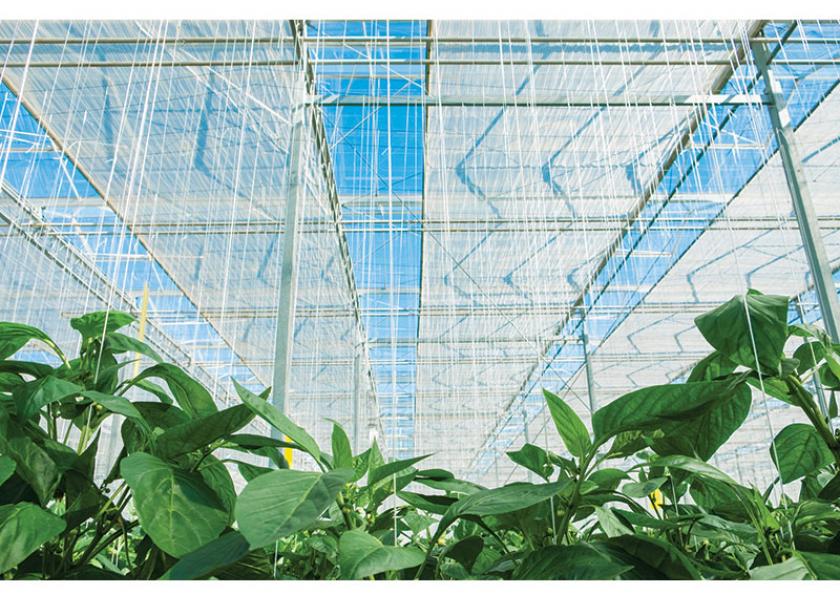Nature Fresh Farms thrives on sustainability

Not only does Leamington, Ontario-based Nature Fresh Farms grow a wide selection of certified organic and conventional peppers, cucumbers and tomatoes in more than 200 acres of high-tech greenhouses, but it grows them sustainably with emphasis on things like water conservation, biofuel alternatives, integrated pest management and food waste recovery.
“Sustainability is an increasingly important issue with more consumers demanding companies to become socially responsible and adopt sustainable practices,” said Sarah Krzysik, public relations coordinator.
“Companies needing to become socially responsible must continuously move toward a system that is more sustainable — environmentally, economically and socially,” she said.
Over time, developing sustainable business practices fosters company longevity and increases profits, she added.
Efficient water use facilitated by means of drip irrigation is one way Nature Fresh works toward sustainability.
“The placement of our dripper tubes makes it easy for our growers to deliver precise volumes of nutrient water directly to the root systems of our plants,” Krzysik said.
The drip irrigation process uses a pressure-compensated drip tube system that releases a specified volume of water once a certain amount of water pressure is applied to the dripper’s release valve.
This allows for water and nutrients to be evenly distributed across the entire crop, she said.
Read more about sustainability here.
The company also uses a closed-loop irrigation system, which means that excess water that plants don’t take up through their root systems is collected, tested, cleaned and sent back out to the plants.
“Through our closed-loop irrigation system, we recycle and recirculate over 300 million liters of fertilizer-rich water per year,” she said.
Sustainability also is achieved through use of biofuel and alternative ways of powering operations using waste products or other forms of “clean” energy, Krzysik said.
“A biomass boiler uses renewable fuel to create energy,” she said.
“We could use several different substances to power our biomass boilers — we’ve experimented with materials such as corn cobs and oat hull pellets — but we’ve come to the conclusion that the best fuel for our boilers is clean waste wood that has not been chemically treated and that may have ended up in a landfill if we did not burn it in our biomass boilers,” she said.
In addition to receiving wood from sources in the community, Nature Fresh burns any clean wood products found on its farm, including damaged pallets and scrap wood from construction sites.
Using integrated pest management or similar growing methods to minimize pesticide and fertilizer use also helps ensure sustainability.
“We currently use 19 different species of good bugs in our greenhouses for pest management,” Krzysik said.
These bugs include the cucumeris, lacewing, degeneran and persimilis, she said, while bumble bees are used for pollination.
“Every bug we use for managing pests and maintaining plant health is unique,” Krzysik said. “They each fight different bad bug species, require different application processes and look and act differently than one another.”
Nature Fresh uses the bugs to create a balanced and biodiverse system in its greenhouses to ultimately reduce the need for pesticides, she said.
Eliminating food waste is another step in the sustainability process.
When the company ends up with greenhouse-grown products that can’t be sold at the retail level but are still nutritious and fully edible, they’re donated to local organizations that pass them along to those in need.
“We donate every week to Plentiful Harvest Food Rescue Program and from there they distribute it throughout the local area and also ship it to Daily Bread Food Bank in the Toronto area,” Krzysik said.
Since the program began, Nature Fresh has donated 427,725 pounds of food to Plentiful Harvest with 75,759 pounds donated to the Downtown Mission of Windsor.
Nature Fresh uses its website and social media to keep followers up to date on its sustainability practices and strategies.
Most recently, the company launched a plant-a-tree campaign on its social media platforms when it announced its home compostable cucumber wrap, Krzysik said.
With every share of its promotional post, Nature Fresh Farms will plant one tree.
“We thought this campaign would help share the news of this new-to-North America packaging while helping the environment,” she said.
“Our website also contains a blog that is regularly updated and shares content on a range of topics including our ongoing sustainability initiatives.”
Here are a few ways to ensure you never miss The Packer's sustainability content:
Catch up on what you missed at our first Sustainable Produce Summit, including full videos of the keynotes and presentations. Watch here.
Lettuce Learn More is a podcast focused on produce industry education, brought to you by The Packer. Season one of the podcast features educational sessions from the Sustainable Produce Summit. Listen here.








